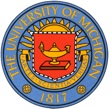In the U.S, pharmacology, the application of research to the use of drugs in the cure of disease, is only as old as the U-M's department. This fall, in Ann Arbor, the two will celebrate their one hundredth anniversary.
John Jacob Abel, the first person to hold a professorship in pharmacology in the U.S., arrived at the U-M in 1891. The Medical School recruited him from the Strasbourg laboratory of the reknowned Professor Oswald Schmiedeberg, the Nineteenth Century's most distinguished pharmacologist. Because the science of pharmacology had developed in Germany during the latter half of the 1800s, the U-M had thought of hiring a German scholar to fill the post in Ann Arbor. However, Schmiedeberg recommended that the University consider a young man who had been studying in his laboratory. Abel was not only an American, but also a graduate of the U-M. He had attended the University from 1876-79 and returned in 1883 to earn a Ph.B. degree.
Although Abel was hired away from the U-M two-and-one-half years later by the Johns Hopkins Medical School, he had already introduced pharmacology as requisite to the medical curriculum. Still it would take another 50 years at the U-M for the department to formally change its name from the archaic "Materia Medica and Therapeutics" to pharmacology.
Aside from its historical significance, the department is best known for the "Monkey Colony" established by the late Maurice H. Seevers to test the effects of painkilling drugs on Rhesus monkeys.
Often confused with the School of Pharmacy, pharmacology is a department within the medical school. Pharmacology offers courses to students in dentistry, pharmacy, medicine, nursing, and Rackham. The faculty-student ratio is virtually one-to-one with 46 Ph.D. students versus 39 faculty including joint appointments. Since 1945, the first year a Ph.D in pharmacology was awarded, the department has graduated 140 alumni/ae, many of whom hold prominent teaching and research positions worldwide.
From September 26-28, research scientists, doctors, presidents of pharmaceutical companies, a Nobel laureate, and hundreds of graduates from around the globe, will celebrate U-M's centennial.
The event has taken three years of planning, according to department administrator Dennis Ondreyka. Symposiums on Friday will explore advances in cardiovascular and neuropharmacology and substance abuse. Saturday's speakers include Sir James Black from Kings College School of Medicine in London, who was awarded the Nobel Prize for his development of a type of anti-histamine drug that is effective in the treatment of peptic ulcers and a group of drugs, which are now widely used to treat cardiovascular disease.
Some 300 alumni/ae are expected to participate, according to department chair Raymond E. Counsell. The symposia in Hale auditorium are open to the public
—Stephen Rosoff
The Michigan Alumnus
Mar/April 1991, page 15




